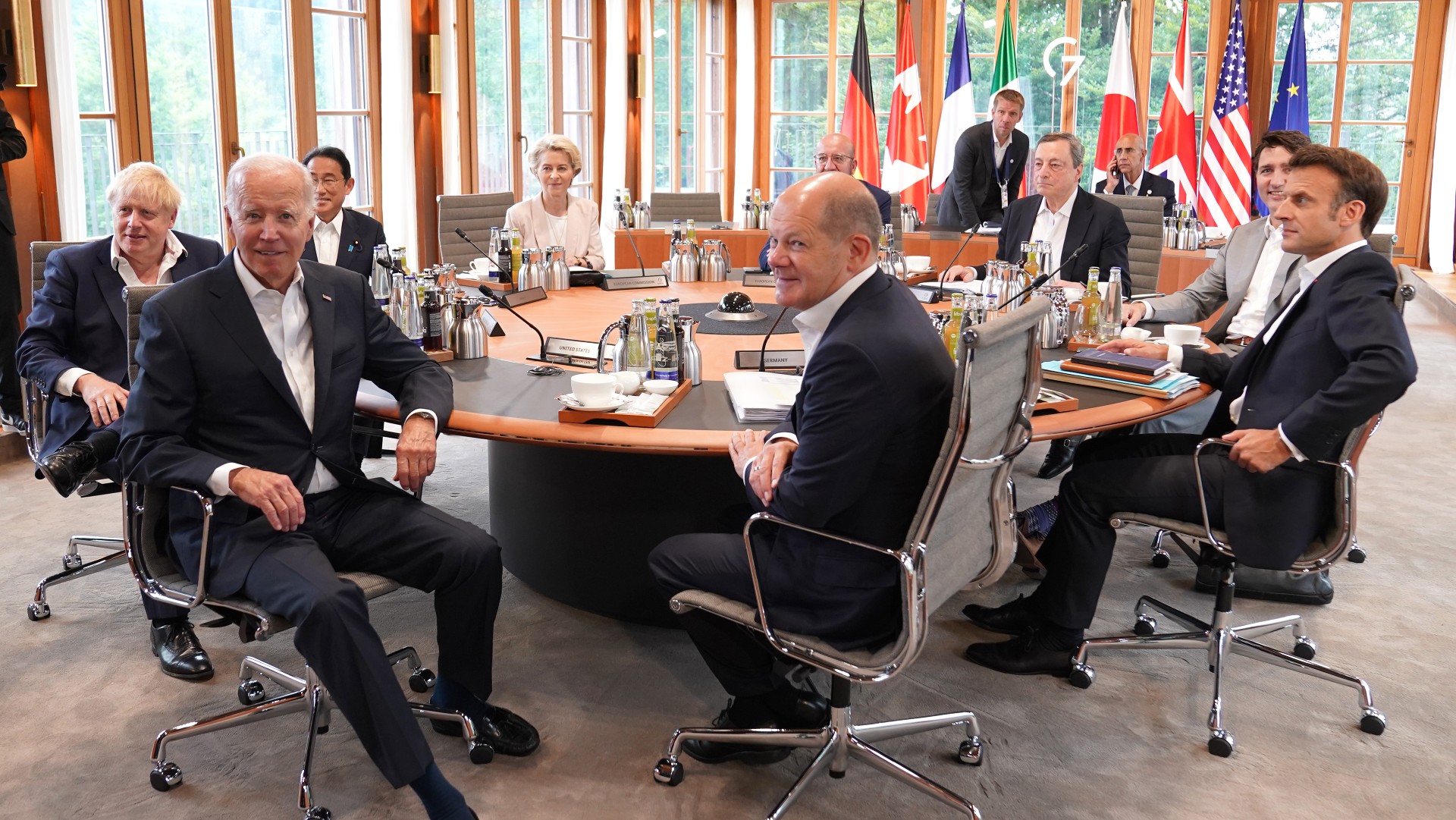‘Playground insults’: what world leaders have said about Vladimir Putin
‘Extraordinary banter’ from G7 met with more intense Russian missile strikes

A free daily email with the biggest news stories of the day – and the best features from TheWeek.com
You are now subscribed
Your newsletter sign-up was successful
Western leaders traded insults with Vladimir Putin this week as Russia bombarded Ukraine with an intense wave of missile strikes.
At a meeting in Germany last weekend, G7 leaders poked fun at the Russian president’s “penchant for stripping off during photoshoots”, said The Guardian.
Boris Johnson joked that they should show Russia their “pecs”, while Canada’s Justin Trudeau suggested some “bare-chested horseback riding”.
The Week
Escape your echo chamber. Get the facts behind the news, plus analysis from multiple perspectives.

Sign up for The Week's Free Newsletters
From our morning news briefing to a weekly Good News Newsletter, get the best of The Week delivered directly to your inbox.
From our morning news briefing to a weekly Good News Newsletter, get the best of The Week delivered directly to your inbox.
Putin responded by telling reporters that would be a “disgusting sight”.
‘Lunatic’ with ‘small-man syndrome’
Johnson launched so many put-downs this week that Downing Street was forced to deny there was a “deliberate policy” to undermine Putin with mockery, said The Telegraph.
On Wednesday, the British prime minister told German broadcaster ZDF that the Russian leader’s “crazy, macho war” in Ukraine was “a perfect example of toxic masculinity”, while his defence secretary, Ben Wallace, called Putin a “lunatic” with “small man syndrome”.
Other politicians from across the world have levelled similar charges, some gravely serious and some more personal.
A free daily email with the biggest news stories of the day – and the best features from TheWeek.com
Peter Dutton, Australia’s defence minister when the invasion started in February, called Putin a “paranoid and ruthless” dictator, while Republican Senator for Utah Mitt Romney said he was a “small, evil, feral-eyed man”.
Joe Biden has described his Russian counterpart as a “war criminal” and a “butcher”. At the time France’s President Emmanuel Macron said he “wouldn’t use terms like that” because he was still in talks with Putin to end the war.
Diplomatic exit
Although negotiations have so far failed to stop Russia, Macron suggested again last month that the West must “not humiliate Russia so that the day when the fighting stops we can build an exit ramp through diplomatic means”.
His comments “sparked a new wave of criticism and incomprehension”, showing up “splits in the Western alliance”, said France 24.
“Playground insults appear to be the latest military development to come out of the war,” said The Hound at Reaction. The columnist suggested “the G7’s leaders are now no doubt huddled around the climbing frame trying to think of a comeback” for Putin.
But The Economist noted that the “history of world leaders exchanging verbal barbs is a long and catty one”, with insults long used as “a tool of diplomacy”.
“Autocrats, perhaps unsurprisingly, show most disdain for their democratically elected opposite numbers,” said the newspaper in the lead-up to the conflict. While it doesn’t usually enhance their reputation on the world stage, they “may enjoy projecting a sense of strength and self-confidence to their countrymen, for being seen to defy outsiders”.
Humour a ‘powerful weapon’
The Daily Mail observed that the “extraordinary banter” at the G7 summit came as Russia “ramped up its attacks” in Ukraine. Kyiv was attacked for the first time in weeks on Sunday morning and a day later missiles hit a busy shopping centre in Kremenchuk. “The undiplomatic chat risks further inflaming tensions,” claimed the paper.
But Ukrainian President Volodymyr Zelenskyy, himself a comedy actor turned wartime leader, has argued that Putin is “very much” afraid of humour.
Speaking to The Atlantic, he said comedy remains a “powerful weapon” because it is easy to grasp. “Jesters were allowed to tell the truth in ancient kingdoms,” he told the magazine, but Russia “fears the truth”.
-
 Should the EU and UK join Trump’s board of peace?
Should the EU and UK join Trump’s board of peace?Today's Big Question After rushing to praise the initiative European leaders are now alarmed
-
 Local elections 2026: where are they and who is expected to win?
Local elections 2026: where are they and who is expected to win?The Explainer Labour is braced for heavy losses and U-turn on postponing some council elections hasn’t helped the party’s prospects
-
 Witkoff and Kushner tackle Ukraine, Iran in Geneva
Witkoff and Kushner tackle Ukraine, Iran in GenevaSpeed Read Steve Witkoff and Jared Kushner held negotiations aimed at securing a nuclear deal with Iran and an end to Russia’s war in Ukraine
-
 ‘The forces he united still shape the Democratic Party’
‘The forces he united still shape the Democratic Party’Instant Opinion Opinion, comment and editorials of the day
-
 How corrupt is the UK?
How corrupt is the UK?The Explainer Decline in standards ‘risks becoming a defining feature of our political culture’ as Britain falls to lowest ever score on global index
-
 ‘The mark’s significance is psychological, if that’
‘The mark’s significance is psychological, if that’Instant Opinion Opinion, comment and editorials of the day
-
 Trump’s ‘Board of Peace’ comes into confounding focus
Trump’s ‘Board of Peace’ comes into confounding focusIn the Spotlight What began as a plan to redevelop the Gaza Strip is quickly emerging as a new lever of global power for a president intent on upending the standing world order
-
 The high street: Britain’s next political battleground?
The high street: Britain’s next political battleground?In the Spotlight Mass closure of shops and influx of organised crime are fuelling voter anger, and offer an opening for Reform UK


